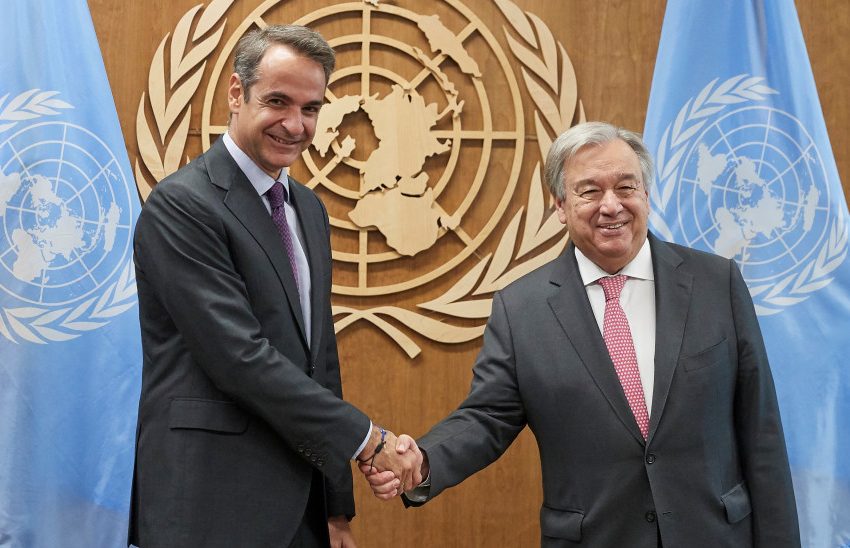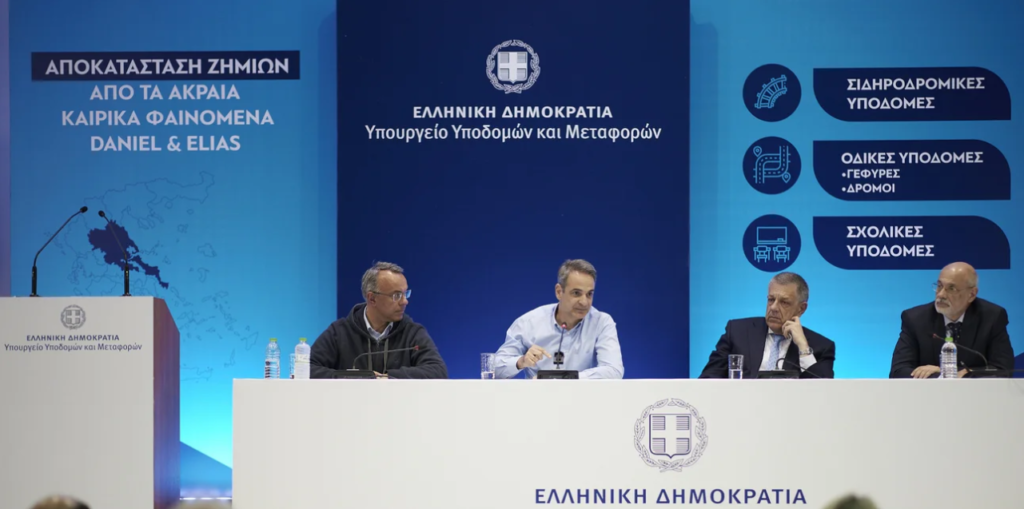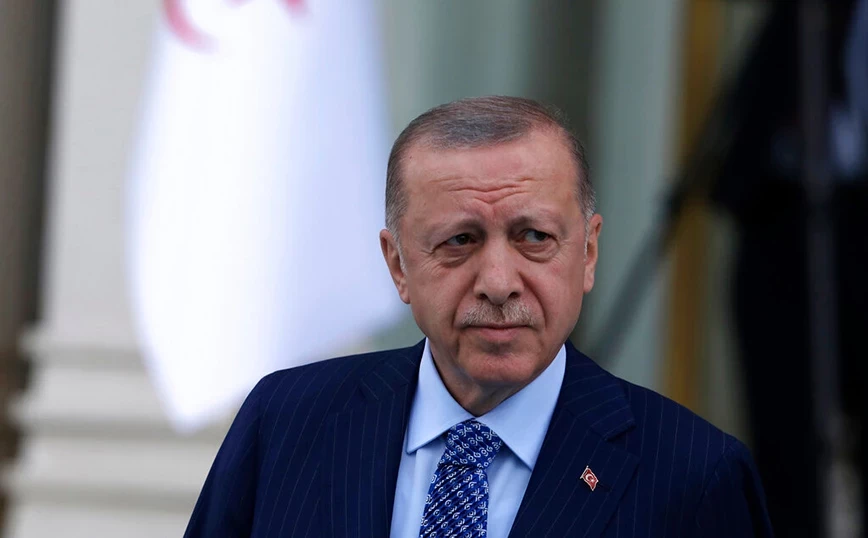Το πλήρες κείμενο της επιστολής Μητσοτάκη στον Γκουτέρες για τις προκλήσεις της Τουρκίας με το Oruc Reis- Η πρόταση για διάλογο

Το Libre δημοσιεύει το πλήρες κείμενο της επιστολής προς τον Γενικό Γραμματέα του ΟΗΕ Αντόνιο Γκουτέρες και τα μέλη του Συμβουλίου Ασφαλείας που απέστειλε ο πρωθυπουργός Κυριάκος Μητσοτάκης, καταγγέλλοντας την τουρκική παραβατικότητα στην Ανατολική Μεσόγειο. Στην επιστολή περιγράφεται η παραβατικότητα της Τουρκίας εντός της ελληνικής υφαλοκρηπίδας και επισημαίνεται η πρόθεση της Ελλάδας για διάλογο εφόσον υπάρξει αποκλιμάκωση.
«Από τις 21 Ιουλίου 2020, έχουμε δει μια μεγάλη κλιμάκωση τουρκικών επιθετικών ενεργειών και ρητορικής που αποτελούν μια ανοιχτή και άνευ προηγουμένου απειλή για την κυριαρχία και τα κυριαρχικά δικαιώματα της Ελλάδας, καθώς και για την ειρήνη και τη σταθερότητα στην ευρύτερη περιοχή», αναφέρει, μεταξύ άλλων, ο πρωθυπουργός στην επιστολή, την οποία έδωσε στη δημοσιότητα ο ANT1.
Επιπλέον, τονίζει ότι η Ελλάδα «έχει δείξει την ετοιμότητά της να επιλύσει τη διαφωνία της με την Τουρκία σχετικά με την οριοθέτηση των θαλάσσιων περιοχών (…) μέσω διαλόγου και σύμφωνα με το Διεθνές Δίκαιο, αλλά όχι υπό συνθήκες στρατιωτικής πίεσης και απειλών».
Σύμφωνα με τον ίδιο, «η Ελλάδα υποστήριξε πολύ τις προσπάθειες διαμεσολάβησης της Γερμανίας», ενώ τα δύο Υπουργεία Εξωτερικών συμφώνησαν να ανακοινώσουν «την επανάληψη των συνομιλιών». Επισημαίνει, ωστόσο, ότι «με το πρόσχημα ότι η Ελλάδα και η Αίγυπτος έχουν συνάψει συμφωνία οριοθέτησης, η Τουρκία δεν συμφώνησε με την παραπάνω ανακοίνωση και την επανάληψη των διερευνητικών συνομιλιών, παρά τη δηλωμένη «δέσμευσή της για διάλογο».
Μεταξύ άλλων αναφέρεται:
…Η Τουρκία αποφάσισε να αναπτύξει έναν μεγάλο στρατιωτικό στόλο για να συνοδεύσει το παραπάνωσεισμικό ερευνητικό σκάφος Oruc Reis, και, επιπλέον, για να αυξήσει τη στρατιωτική της παρουσία στο Αιγαίο και σε περιοχές της Ανατολικής Μεσογείου κοντά στα νησιά της Ρόδου και το Καστελόριζο.
Παρά όλα τα παραπάνω, η Ελλάδα έχει δείξει την ετοιμότητά της να επιλύσει τη διαφωνία της με την Τουρκία σχετικά με την οριοθέτηση των θαλάσσιων περιοχών στο Αιγαίο και στην Ανατολική Μεσόγειο, μέσω διαλόγου και σύμφωνα με το Διεθνές Δίκαιο, αλλά όχι υπό συνθήκες στρατιωτικής πίεσης και απειλών.
Επιπλέον, η Ελλάδα υποστήριξε πολύ τις προσπάθειες διαμεσολάβησης της Γερμανίας σχετικά με την επανάληψη των διερευνητικών συνομιλιών μεταξύ Ελλάδας και Τουρκίας. Αναφορικά με αυτό, τα δύο Υπουργεία Εξωτερικών συμφώνησαν να ανακοινώσουν την επανάληψη των συνομιλιών. Ωστόσο, με το πρόσχημα ότι η Ελλάδα και η Αίγυπτος έχουν συνάψει συμφωνία οριοθέτησης, η Τουρκία δεν συμφώνησε με την παραπάνω ανακοίνωση και την επανάληψη των διερευνητικών συνομιλιών, παρά τη δηλωμένη «δέσμευσή της για διάλογο».
Περιττό να πούμε ότι αυτή η συμφωνία, η οποία είναι το αποτέλεσμα μακράς και καλής πίστης διαπραγματεύσεις μεταξύ Ελλάδας και Αιγύπτου, βάσει των σχετικών διατάξεων της Σύμβαση των Ηνωμένων Εθνών για το Δίκαιο της Θάλασσας, είναι υψίστης σημασίας για σταθερότητα στην Ανατολική Μεσόγειο, την οποία η Τουρκία και η κυβέρνηση της Λιβύης (LNA) επιχείρησε να υπονομεύσει μέσω της παράνομης και παράλογης «οριοθέτησης» μεταξύ των δύο χωρών.
Αντιδρώντας στα παραπάνω, η Τουρκία εξέδωσε μια νέα NAVTEX για δραστηριότητες εξερεύνησης, και έστειλε το Oruc Reis, συνοδευόμενο αυτή τη φορά από 17 πολεμικά πλοία και δύο βοηθητικά πλοία στην περιοχή. Δύο ελληνικές φρεγάτες παρακολουθούσαν τη δραστηριότητά τους. Ταυτόχρονα, ο τουρκικός στόλος αναπτύχθηκε στο Αιγαίο και οι Ελληνικές Ένοπλες Δυνάμεις τέθηκαν σε κατάσταση υψίστου συναγερμού. Η Τουρκία γνωρίζει καλά ότι η ανάπτυξη μεγάλου αριθμού στρατιωτικών πλοίων κινδυνεύει να προκαλέσει στρατιωτικό επιεσόδιο όπως αυτό που συνέβη στις 12 Αυγούστου 2020.
Πράγματι, κατά τη διάρκεια αυτού του περιστατικού, δύο φρεγάτες, η ελληνική “Λήμνος” και η τουρκική “Κεμάλ Ρέις”, συγκρούστηκαν στην περιοχή στην οποία υπήρχε το Oruc Reis, λόγω ότι το τουρκικό πλοίο παραβίασε τους σχετικούς ναυτιλιακούς κανονισμούς. Το “Κεμάλ Ρεις υπέστη σοβαρές ζημιές, αλλά οι δύο πλευρές συμφώνησαν να μην κλιμακωθεί η κατάσταση, αναγνωρίζοντας ότι το περιστατικό δεν ήταν σκόπιμο. Η ελληνική πλευρά κράτησε το περιστατικό εμπιστευτικό, αποφεύγοντας τη δημοσιότητα. Ωστόσο, την επόμενη μέρα, το περιστατικό αναφέρθηκε, με διαστρεβλωμενο τρόπο, όχι μόνο από τα τουρκικά μέσα ενημέρωσης, αλλά και τό ίδιο τον Πρόεδρο Ερντογάν.
Ολόκληρη η επιστολή του πρωθυπουργού στον Αντόνιο Γκουτέρες (κείμενο στα αγγλικά)
Letter dated 4 September 2020 from the Permanent
Representative of Greece to the United Nations addressed to the
President of the Security Council
I have the honour to enclose herewith a letter dated 3 September 2020, addressed
to the Secretary-General of the United Nations from the Prime Minister of Greece,
Kyriakos Mitsotakis (see annex).
I would be grateful if the present letter and its annex could be circulated as a
document of the Security Council.
(Signed) Maria Theofili
Ambassador
Permanent Representative
S/2020/888
2/4 20-11649
Annex to the letter dated 4 September 2020 from the Permanent
Representative of Greece to the United Nations addressed to the
President of the Security Council
I wish to bring to the attention of the United Nations the following events which
cause us great concern.
In the past few months, Turkey has been engaged in a series of unlawful and
provocative acts in the Eastern Mediterranean, in particular since the signing on
27 November 2019, of the illegal Memorandum of Understanding on maritime
borders with Libya’s Government of National Accord. This Memorandum was never
endorsed by the Libyan Parliament as required by article 8, paragraph 2 (f) of the
Skhirat Agreement of 2015, and was concluded despite the fact that the two countries
have no common maritime boundaries. Furthermore, it completely ignores the
presence of the Greek islands in the region.
However, since 21 July 2020, we have witnessed a major escalation of Turkish
aggressive acts and rhetoric that constitute an open and unprecedented threat to
Greece’s sovereignty and sovereign rights, as well as to the peace and stability of the
broader region.
It should be stressed that, at the core of the above acts, lies Turkey’s intention
to deprive Greece of its reasonable and legitimate sovereign rights in the Eastern
Mediterranean by refusing to recognize the Greek islands’ maritime zones beyond six
nautical miles of territorial sea, in flagrant violation of the provisions of the
international law of the sea and international jurisprudence.
More specifically, on 21 July 2020, Turkey issued a navigational warning
(NAVTEX) announcing the conduct of seismic survey activities by the Oruc Reis
research vessel in the Mediterranean, including within an area falling under Greek
jurisdiction, for the period between 21 July and 2 August 2020. It is important to note
that in that specific area, according to a recent statement by the Turkish Foreign
Minister, Mevlüt Çavuşoğlu, “there are overlapping claims with Greece”. Since,
however, Turkey believes that there are competing claims, it should also be aware
that it has a clear obligation deriving from well-established rules of the law of the sea,
to negotiate in good faith for the settlement of these claims, pending which it should
refrain from pursuing hydrocarbon research activities in that maritime area, as well
as from any other unilateral act not in conformity with the fundamental rules of
international law.
Instead, Turkey decided to deploy a large military fleet to accompany the above
seismic research vessel Oruc Reis, and, in addition, to increase its military presence
in the Aegean and in areas of the Eastern Mediterranean close to the islands of Rhodes
and Kastellorizo.
Despite all of the above, Greece has shown its readiness to resolve its dispute
with Turkey regarding the delimitation of the maritime areas in the Aegean and
Eastern Mediterranean, through dialogue and according to international law, but not
under conditions of military pressure and threats.
Furthermore, Greece has been very supportive of the German mediation efforts
regarding the resumption of the exploratory talks between Greece and Turkey. In this
respect, the two Ministries for Foreign Affairs had agreed to announce their
resumption.
On the pretext, however, that Greece and Egypt have concluded a maritime
delimitation agreement, Turkey did not agree to the above announcement and the
resumption of the exploratory talks, despite its declared “commitment to dialogue”.
S/2020/888
20-11649 3/4
Needless to say that this agreement, which is the outcome of long and good faith
negotiations between Greece and Egypt, based on the relevant provisions of the
United Nations Convention on the Law of the Sea, is of paramount importance for
stability in the Eastern Mediterranean, which Turkey and the Libyan Government of
National Accord attempted to undermine through an illegal and irrational
“delimitation” between the two countries.
Reacting to the above, Turkey issued a new NAVTEX for exploration activities,
and sent the Oruc Reis, escorted this time by 17 warships and two auxiliary vessels,
to the area. Two Greek frigates were monitoring their activity. Simultaneously, the
Turkish fleet was deployed in the Aegean and Greek Armed Forces were put on high
alert.
Turkey is well aware that the deployment of a high number of military vessels
risks provoking a military incident such as the one that took place on 12 August 2020.
Indeed, during that incident, two frigates, the Greek Limnos and the Turkish Kemal
Reis, collided in the area in which the Oruc Reis was present, owing to the Turkish
vessel’s violation of the relevant maritime regulations. The Kemal Reis sustained
serious damage, but the two sides agreed not to escalate, recognizing that the incident
was not intentional. The Greek side kept the incident confidential, avoiding publicity.
However, the next day, the incident was reported, in a distorted manner, not only by
the Turkish media, but also by President Erdogan himself.
In addition, Turkey recently issued two more unauthorized NAVTEX warnings,
announcing the conduct of illegal activities by the research vessel Oruc Reis, until
13 September, in the same sea area of the previous NAVTEX, and as close as 32 miles
south of the Greek island of Kastellorizo. At the same time, the Turkish fleet continues
to be deployed throughout the Aegean Sea and around this island. I wish to stress that
Kastellorizo is an inhabited island close to Rhodes that forms part of the Dodecanese
islands, and which Turkey tries to present as an isolated island, far from the Greek
mainland, which in its view is a priori not entitled to any maritime zones other than
territorial waters. This position however is contrary to the law of the sea and is not
sustained by international jurisprudence.
I would be remiss not to mention in this respect the aggressive and
unprecedented rhetoric against Greece by Turkish high officials, including President
Erdogan himself and the Foreign Minister, Mevlüt Çavuşoğlu, who openly threaten
to wage war against Greece in case the latter extends its territorial waters in the
Aegean to 12 nautical miles (“In the Aegean, Greece cannot extend its borders to
12 miles…. This is a cause of war (casus belli) … We are not going to allow Greece
to extend its territorial waters from 6 to 12 miles”, “I am being pretty clear.”)
All the above clearly demonstrate Turkey’s overt intention to continue its
provocative behaviour towards Greece so as to create faits accomplis on the ground
in the maritime area of the eastern Mediterranean, at the expense of Greece ’s
reasonable and legitimate rights, and notwithstanding the fact that such a behaviour
dangerously increases tensions and instability in that area.
Moreover, Turkey threatens openly to use force against Greece by the massive
display of its military fleet in the Eastern Mediterranean and as indicated by the
explicit declarations to that effect of its officials, should Greece not concede to
Turkey’s unreasonable and legally unfounded claims. This aggressive behaviour is
against the Charter of the United Nations itself, which explicitly forbids States to use
force or threaten to use force in their international relations.
The international community cannot and should not tolerate such an unlawful
attitude by Turkey which seriously endangers regional peace and security, and should
call upon this country to immediately cease all of the above illegal activities and abide
S/2020/888
4/4 20-11649
by the provisions of the Charter and international law, including the rules of the law
of the sea.
Allow me to conclude by stressing that Greece remains committed to the
principles of the peaceful settlement of disputes as enunciated in the Charter of the
United Nations, and is ready to resume its dialogue with Turkey from the point at
which they were interrupted in March 2016, on the basis of international law,
including the law of the sea. This requires, however, that Turkey on its part is willing
to cease any illegal activity in the Eastern Mediterranean and refrain from
inflammatory statements and provocative actions that stand in the way of a
meaningful dialogue.
I would be grateful if you could have the present letter circulated as a document
of the Security Council.
(Signed) Kyriakos Mitsotakis














